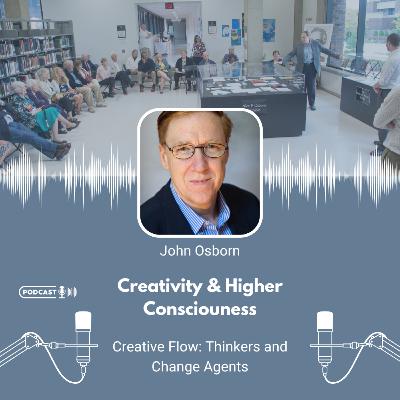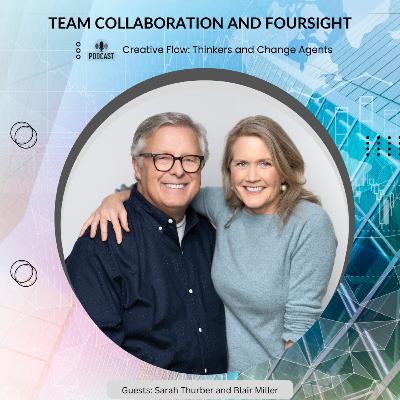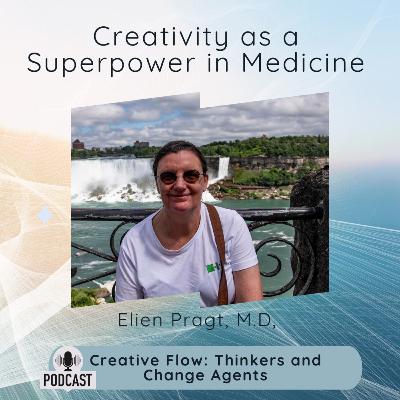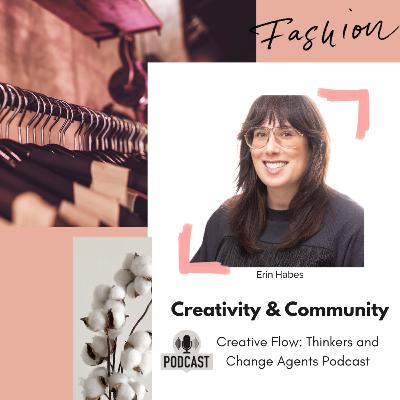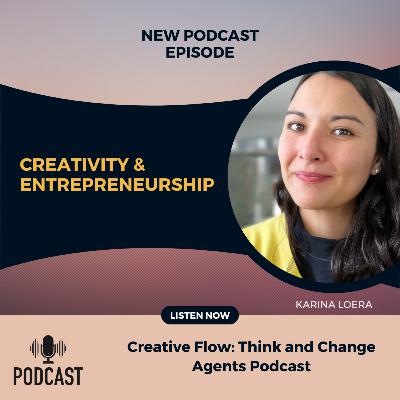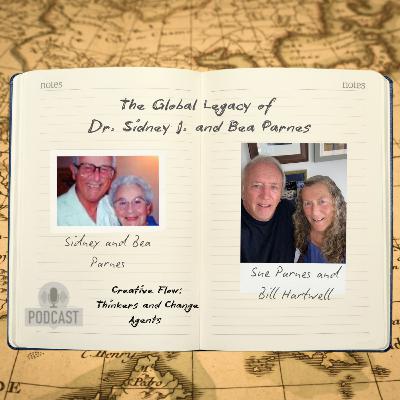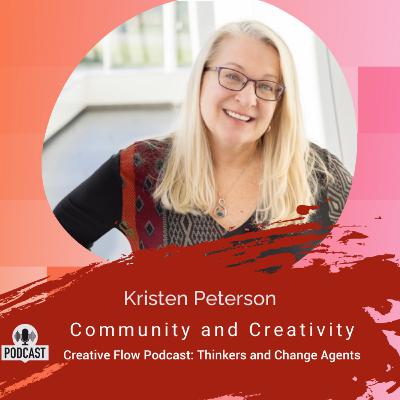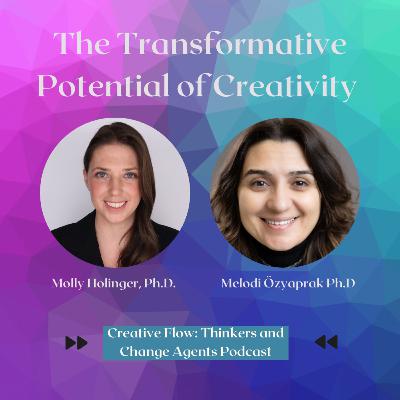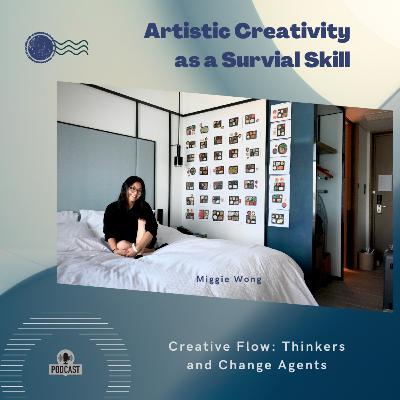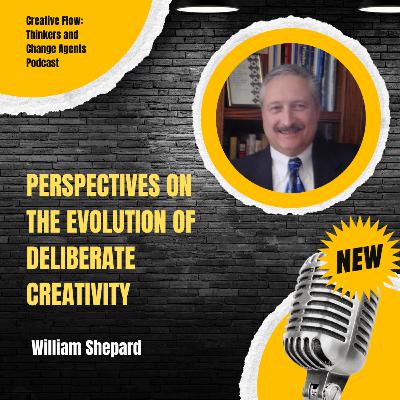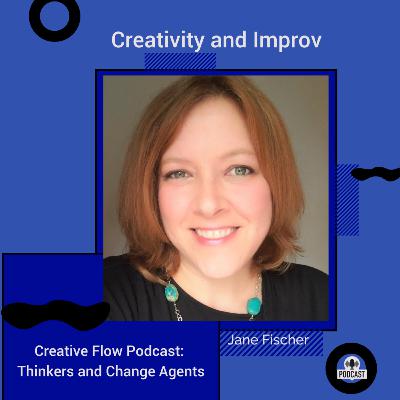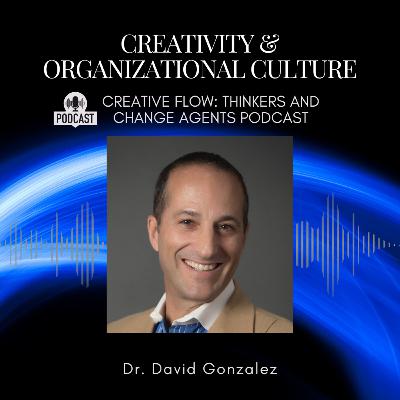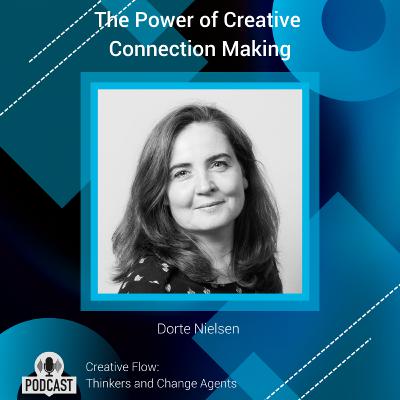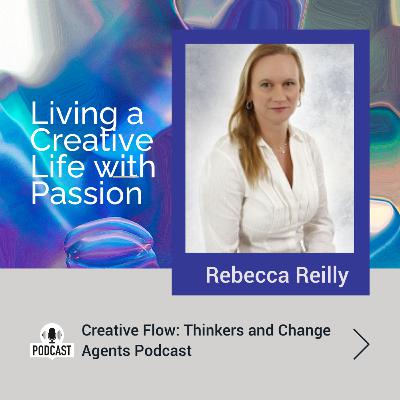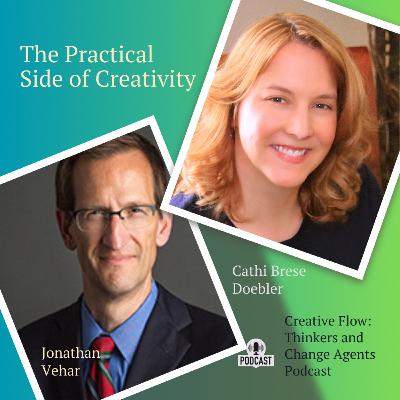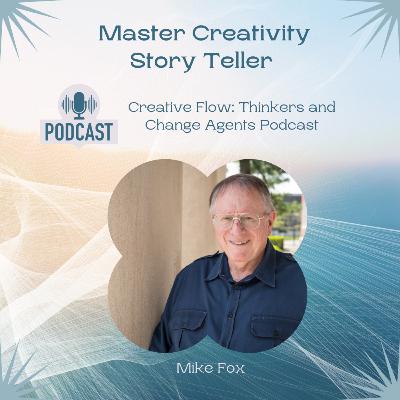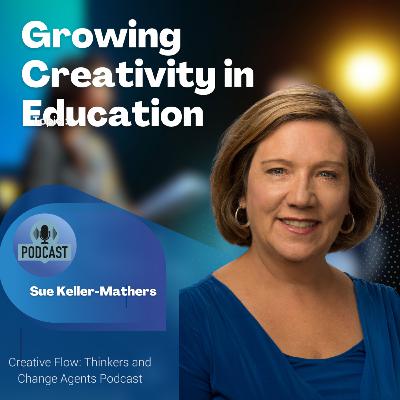Discover Creative Flow: Thinkers and Change Agents
Creative Flow: Thinkers and Change Agents

Creative Flow: Thinkers and Change Agents
Author: Kim Marie McKernan
Subscribed: 4Played: 13Subscribe
Share
© Kim Marie McKernan
Description
Hosted by Anthony Billoni and Kim Marie McKernan, the Creative Flow Podcast Series features discussions with thinkers and change agents important to the Science of Creativity. We invite you to tune into the series to hear experts who are actively applying creativity, creative problem solving (CPS), innovation, and more to help change the world.
54 Episodes
Reverse
The 53rd episode of The Creative Flow: Thinkers and Change Agents Podcast features Susan Robertson, a possibility architect who empowers teams and organizations to navigate change by embracing creative thinking. As an instructor at Harvard, Susan combines the neuroscience of creativity with over 20 years of experience coaching Fortune 500 companies. She brings a scientific foundation and a dose of fun to help make behavior change stick.Discover key takeaways about the neuroscience behind our thinking habits. Susan explains the "negativity bias" and why our brains instinctively resist uncertainty and new ideas. You'll gain insights into the power of shifting from a "Yes, but" to a "Yes, and" mindset, fostering true creative collaboration and innovative solutions in both your professional and personal life. Don't miss the 3-minute Lab: Decoy video she recommends at https://youtu.be/F-TyPfYMDK8?si=HhdjVRYzzsO31Tpc.Listeners will learn practical, science-backed methods for unlocking creativity and making a significant mindset shift. This episode offers practical guidance on overcoming mental blocks, cultivating a culture of possibility, and applying neuroscience principles to drive innovation. Tune in to learn how to build new habits that will change the way you see the world.
The 50th episode of the Creative Flow: Thinkers and Change Agents Podcast features an inspiring conversation with John R. Osborn, an advertising veteran and long-time supporter of creative problem solving. With a legacy steeped in innovation, John is the co-founder and CMO of ad tech startup Turnstīl, a former Senior VP at BBDO, and grandson of creativity pioneer Alex Osborn, the inventor of brainstorming and founder of the Creative Problem Solving Institute (CPSI).This episode explores John’s incredible insights on creativity as a higher state of consciousness and its transformative role in business, education, and personal growth. You'll discover:How creativity shaped John’s career in advertising and entrepreneurship Lessons from his time with the Creative Education Foundation Practical applications of deliberate creative problem solving Whether you’re a seasoned professional looking to elevate your creative potential or someone curious about the science of creativity, this episode offers stories about how creativity can drive positive change. Tune in and be inspired to harness creativity at a higher level.
The 43rd episode of the Creative Flow Podcast features a conversation with Sarah Thurber and Blair Miller, the co-founders of Foursight, a company that develops research-based tools and training to help teams think more creatively, work more collaboratively, and achieve better results. They share their personal journeys into the field of deliberate creativity and explore how their shared passion for creativity has shaped their marriage and collaborative efforts.
Sarah and Blair discuss their new book Good Team, Bad Team: Lead Your People to Go After Big Challenges, Not Each Other, and provide examples of how they've used creative problem-solving to tackle personal and professional challenges, from managing household finances to leading volunteer efforts in their community. This is your chance to learn the inside story of Foursight, a framework that measures individual and team preferences for four critical types of thinking: clarifying, ideating, developing, and implementing. Their work has deepened the understanding of the interconnectivity between person, process, press (environment), and product in the creative process and shows how self-knowledge can help teams solve complex problems.
Blair and Sarah share their hopes for the future of the science of creativity in leadership development and making creative problem-solving accessible to all. Don’t miss this conversation that explores the power of creativity to transform personal relationships, organizational cultures, and societal challenges.
The 42nd episode of the Creative Flow Podcast features guest Elien Pragt, M.D., an intensivist at an academic hospital in the Netherlands, working to bring creativity into medicine. She shares her journey of learning creative problem solving techniques and pursuing a Master's Degree in Creativity and Change Leaders at Buffalo State University's International Center for Studies in Creativity.
Elien discusses why creativity is essential in healthcare to address issues such as burnout and retaining hospital personnel. One of her goals is to create a workshop for a shared vision for creativity in her hospital by 2030. She designed an interactive course for second-year medical students, where they can work on a self-chosen medical problem in groups using creative problem-solving and design thinking to solve it.
Don’t miss this conversation, which explores how creativity can be spread throughout an entire healthcare ecosystem over the next decade. Learn powerful advice to help others trying to implement creativity in their organizations, emphasizing the need for a motivated role model.
Our 38th episode of the Creative Flow: Thinkers and Change Agents Podcast Series features Erin Habes, a dedicated fashion and textile technology department lecturer and Runway Faculty Director at Buffalo State University who is passionate about being a catalyst for inclusive fashion in the Buffalo community.
Erin started her career in New York City, opened her store when she returned to Buffalo, and is well-known for producing large-scale fashion shows such as Runway and Mass Appeal. When appointed adjunct faculty in the fashion program, she learned about the Master's Degree in Creativity and Change Leadership at Buffalo State University, and it was what she was seeking to extend her education. She dedicated ten years to completing the degree and discusses how it continues to help her combine the fashion world and Deliberate Creativity.
Erin has developed many partnerships through her work on fashion shows and often plays the role of facilitating meaningful collaborations between students, alums, and entrepreneurs, ensuring diverse perspectives are heard and celebrated. One great example is her work with Visit Buffalo Niagara Buffalo to showcase her home city's beautiful boutiques, fashion, and shopping.
Erin describes the creativity she uses in the classroom and how she helps her students and the Buffalo community champion diversity, equity, and inclusion in fashion. Using design thinking and a focus on empathy, she encourages her students to understand that they are responsible for the products that we are making.
Don’t miss this discussion of how Erin used AI to help her students get new ideas to create a collection for this year’s Runway. To bring the Creative Community together, she is hosting an in-person mixer on January 18, at 7 pm, at Twin Petrels Selzer Company (1250 Niagara St, Buffalo, NY 14213). Please join us if you are in the WNY Region. Find our podcast today on all of your favorite platforms.
Our 35th episode of the Creative Flow: Thinkers and Change Agents Podcast Series features Karina Loera, MS founder of Strategik Minds LLC, and a faculty member for the Masters in Innovation Management at Universidad de la Sabana in Colombia. Karina discusses how she sees Creativity transform the entrepreneurs she works with to grow their businesses. Her other passion is teaching and seeing her students increase their organizational impact by mastering the creative problem solving process. Born and raised in Mexico City, teaching in Colombia, and living in the USA for eight years, she shares insights on how culture impacts our creativity mindset and the tools she uses to create common ground.
Karina left behind a high-powered marketing career to achieve a Master's in Creative Studies and Change Leadership at the Center for Applied Imagination, SUNY Buffalo State University. Her work at the Small Business Development Center gave her an understanding of how entrepreneurs represent the creative person because they constantly face uncertainty. Working with a startup company and now in her own business, she understands how the creative process can help solve daily problems entrepreneurs face.
Karina helped organize the Masters in Innovation Management at Universidad de la Sabana in Colombia and teaches a class on innovation management to give students the tools and resources to develop and ensure innovation is happening in their organization. She shares the thrill of reading their dissertations and describes the many success stories her students have achieved. Learn about Karina's Creative Flow, training people, and imagining the experience she wants participants to have in her class.
Don't miss this discussion of the future of creativity and the insights of a multicultural leader. Find our podcast today on all of your favorite platforms.
The 52nd episode of The Creative Flow: Thinkers and Change Agents Podcast features Marysia Czarski, CEO and founder of Ignition Creativity in Toronto, Canada. With over twenty years of experience, she transforms organizations by replacing outdated operational approaches with agile, human-centered frameworks. Marysia has an MS in Creativity and Change Leadership from Buffalo State University and an HBA from the Ivey Business School, combining deep academic knowledge with extensive corporate experience at companies like Ralston Purina and Cadbury.Discover key takeaways from Marysia's journey, from her early career in consumer packaged goods to her current work in corporate innovation. She shares how integrating human-centered design, Creative Problem Solving (CPS), and agile methodologies helps solve complex problems. Listen to her insights on why understanding people is the most critical component of unleashing creativity and driving impactful results within any organization.Listeners will learn practical tips for developing their own creative abilities and applying these skills in professional settings. This episode provides valuable lessons on navigating ambiguity, challenging the status quo, and using creative processes to foster innovation. Tune in to find inspiration and learn how to leverage the creative potential within yourself and your teams.
The 54th episode of The Creative Flow: Thinkers and Change Agents Podcast features David Eyman, an entrepreneur, innovation leader, product designer, and educator at Miami University. With over 30 years of creative experience and a Master’s in Creative Studies from the Center for Applied Imagination, David shares his journey from industrial design to his current role as Director of Innovation. He believes that shifting from doing what we're supposed to do to what we're capable of can lead to greater happiness and satisfaction. The key takeaways from this conversation focus on the critical importance of developing creative confidence in students. David discusses how adaptable thinking skills are essential for navigating a world of complex problems. He provides his insights on the changes he's seen in students, particularly "digital natives," and the challenge of them outsourcing their critical and creative thinking skills while remaining happy, collaborative, and fast learners. Listeners will learn why creative confidence is an essential outcome of creative mindsets like curiosity, tolerance for ambiguity, and resilience. David offers practical ideas for adapting creative problem-solving processes for a new generation of thinkers. Don’t miss David’s perspective on using AI not as a replacement, but as a thinking partner to augment our own creative abilities, providing a framework for students to engage with technology responsibly.
The 51st episode of the Creative Flow: Thinkers and Change Agents Podcast features husband and wife Sue Parnes and Bill Hartwell celebrating the legacy of Dr. Sidney J. and Bea Parnes. As world-renowned pioneers in creativity, innovation, and creative problem solving, Sid and Bea's work has inspired many across generations, transforming the way we understand and nurture creative potential.Their legacy lives on through our guests, their daughter, Sue, and son-in-law, Bill, who both embody the values and inspiration passed down by Sid and Bea in their lives and communities. Listen to reflections from Sue and Bill on how their parents’ dedication to creativity has had a lasting influence on their work and family life. The stories and memories they share about the global impact of their parents’ work fighting apartheid in South Africa highlight the ripple effects of Sid and Bea’s vision.Tune in for highlights of their remarkable partnership, unique perspective, and a special musical tribute celebrating the spirit of creativity they brought to the world.Listeners will discover practical insights into creativity and innovation, hear personal stories of how Sid and Bea inspired those around them, and gain a deeper appreciation for the power of creative thinking in families in everyday life.
The 49th episode of the Creative Flow Podcast features Kristen Peterson, a master facilitator, trainer, and organizational development consultant with over 20 years of experience working with global giants like Disney, Google, and Starbucks. She’s an alumna and adjunct faculty member of the Center for Applied Imagination at SUNY Buffalo State University and co-founder of Mindcamp Canada. Kristen has spent her career enabling creativity to thrive in organizations and communities.From her personal story of discovering creativity through the Creative Problem Solving Institute (CPSI) to creating an international space for experimentation at Mindcamp Canada for over twenty years, she is passionate about community. She advocates for teaching creativity in schools and providing people from all walks of life with tools to solve problems creatively. Don’t miss this episode, where we learn about her work building impactful programs, such as Facilitators Without Borders, and mentoring professionals worldwide. Tune in to hear Kristen’s insight into developing creative communities and the power of deliberate creativity to build connections through creativity.
The 48th episode of the Creative Flow Podcast features Drs. Molly Holinger and Melodi Özyaprak, esteemed faculty members at the Center for Applied Imagination at SUNY Buffalo State. Molly, an assistant professor with a PhD in educational psychology, researches positive outcomes of creativity. Melodi specializes in creativity in mathematics and gifted education, having founded the first magnet school for gifted students in Turkey. Their careers span roles in institutions like Miami University, the University of Connecticut, and Johns Hopkins, making them pioneers in creativity education and gifted learning.The episode reveals critical insights into creativity education, emphasizing that creativity is not just a skill but a comprehensive approach to understanding and engaging with the world. Molly and Melodi emphasize the importance of experiential learning, structured creativity models, and integrating both cognitive and non-cognitive aspects of creativity. They also discuss the growing recognition of creativity as a fundamental skill by institutions like the World Economic Forum. Together, they offer actionable strategies for incorporating creativity into curriculum development and differentiated learning approaches.Don’t miss this episode, which offers a unique blend of personal creativity journeys, academic insights, and passionate discussions about creativity's transformative potential. The conversation provides a deep understanding of how creativity can be systematically learned, applied across disciplines, and used for personal and professional growth.
Our 39th episode of the Creative Flow: Thinkers and Change Agents Podcast Series features Miggie Wong, a museum professional and artist who creates situation-based performance projects exploring ideas of social interaction, a sense of belonging, and acts of sincerity. Born and raised in Hong Kong and later migrating to the United States, Miggie was creative from a young age but did not have a way to describe her process to others. Studying the Science of Creativity at the Center for Applied Imagination, SUNY Buffalo State, helped her understand how to utilize Creativity as an artist and have a common framework and language to promote it in others.
One example of how Miggie uses Creativity as a survival skill is a project she did when studying for her Bachelor of Fine Arts from the California Institute of the Arts. She created a participatory art project by playing Mahjong for 24 hours to help her make friends despite the language barrier. In 2021, she withstood the enforced isolation of quarantine in a hotel room for 14 days while visiting Hong Kong during the pandemic by working on a creative art project that resulted in her publishing a graphic diary called ‘14 Days Quarantine Meal Drawing Project’. Her current work uses participatory art to connect with her audience and encourage them to tell her stories about the community.
Don’t miss our discussion of Miggie's wish for the future of Creativity as “using scientific and artistic creativity to continue to maintain and improve our well-being.” This concept of art as essential to mental health is aligned with her Creative Flow of making art that encourages a connection with the viewer. Find our podcast today on all of your favorite platforms.
Our 37th episode of the Creative Flow: Thinkers and Change Agents Podcast Series features William Shepard, a thought leader who worked closely with Sid Parnes and many greats in the field of Creative Problem Solving.
Bill's first exposure to Deliberate Creativity was in 1972 when he provided technical and logistical support at the Creative Problem Solving Institute (CPSI), which impacted him personally and professionally. He later obtained a Graduate Certificate in Creativity from the Center for Applied Imagination, SUNY Buffalo State, and served as Director of CPSI and its programs for 18 years.
Bill masterfully walks us through how the history and evolution of the field of Creativity have changed from the beginning to the present day. He describes traveling around the world with Sid and Bea Parnes and working with many of the seminal thought leaders of Creative Problem Solving, such as Ruth Noller, Paul Torrance, and Edward DeBono. He discusses his own emotional breakthrough as he found the side of him that could be creative and the tools to do it deliberately.
Don’t miss this discussion of how he uses the principles and tools personally and professionally for individuals, teams, organizations, and executive coaching. As the Group Vice President of the Creative Problem Solving Group – Buffalo (CPSB), he worked on projects with leading firms worldwide. For him, the most personally and professionally rewarding activity was training individuals within organizations to address problems and challenges better. Find our podcast today on all of your favorite platforms.
Our 36th episode of the Creative Flow: Thinkers and Change Agents Podcast Series features Jane Fischer, a Creative Change Facilitator for individuals and groups who focuses on the tools of applied improvisation and Creativity. Jane is a creative trainer at the Creative Education Foundation with over 25 years of experience developing and delivering educational sessions and 20 years of experience as a professional improv comedy performer.
Jane was involved in the Applied Improvisation community for many years in her hometown of Jamestown and was introduced to the Center for Applied Imagination by a graduate in this group. The program was so transformative that she described her life “BC – Before Creativity” and “AC – After Creativity.” One surprising benefit of the Graduate Certificate in Creativity from the Center for Applied Imagination, SUNY Buffalo State, was the inclusion of Creative Leadership in the curriculum. She credits this degree with helping her to empower her workplace and make everything “exponentially better” for the people who worked for her.
Jane discusses how she uses the improvisational mindset to help teams and organizations experience Creativity. She incorporates exercises and activities from the world of improv, and participants learn how to balance divergent and convergent thinking while finding new and exciting possibilities. One of her favorite success stories involved a person who considered improv fluff until she could practice it and experience the impact it can have on collaboration and communication skills.
Don't miss this chance to laugh while you also hear insights from a respected leader who has a vision for the future of the creativity community, where we will continue to convert people and help them make their “own meaning with creativity.” Find our podcast today on all of your favorite platforms.
The 47th episode features Dr. David Gonzalez, a global expert in talent management, cultural strategy, and leadership development. David is known for blending creativity with actionable business strategies and has worked with the Center for Creative Leadership, groundbreaking startups, and multi-national corporations. David holds a Ph.D. in Human Performance Improvement and a Master's in Creative Studies from the Center for Applied Imagination.What You'll Learn in This EpisodeListeners will discover practical strategies for fostering creativity in both personal and professional contexts. David shares actionable insights on cultivating a creative mindset, building employee engagement, and overcoming barriers to innovation. He examines the role of culture in encouraging bold ideas and shares strategies for helping children lead creative lives. David’s Book RecommendationDavid recommended Jordan Peterson's "12 Rules for Life: An Antidote to Chaos" to help us "untangle the entanglement we all experience at different points in our lives, which limits our vision, creativity, and possibilities."Tune in for a deep dive into deliberate creativity, the impact of organizational climate on innovation, and the synergy between AI and human ingenuity. Don’t miss this discussion of the intersection of technology and creativity and tips on leveraging AI tools to complement human thinking.
The 46th episode features Dorte Nielsen sharing her fascinating journey from the advertising world to becoming a leading researcher and educator on deliberate creativity. She is based in Copenhagen, Denmark, and founded Creative Thinker in Copenhagen. With a background in advertising and a Master's Degree in Creative Studies from the Center for Applied Imagination, Dorte has dedicated her career to understanding the neuroscience behind creative thinking and bringing deliberate creativity into educational and professional settings.
Discover Dorte's insights on the power of connection-making, the role of metaphor in the creative process, and how to think more creatively. She emphasizes the importance of training the brain to make better connections as a core driver of creativity and shares insights on how developing this skill can unlock our innate creative potential.
Dorte's work bringing deliberate creativity into universities teaching creatives and primary schools, from math to history, showcases the transformative impact of teaching creative thinking across the curriculum. This holistic approach can benefit learners at all levels. Learn about her book "The Secret of the Highly Creative Thinker," a practical guide to creativity translated into 11 languages and sold in 65 countries.
Dorte's work and passion for cultivating deliberate creativity have profoundly impacted schools, corporations, and beyond. Tune in, and Dorte's expertise will provide practical strategies and inspiration for unlocking your creative spark.
The 45th episode of the Creative Flow Podcast features Rebecca Reilly, a Fleet Technician for Reddy Bikeshare who works on special innovative efficiency projects focusing on business operations. She has used the Creative Process in all aspects of her personal and professional life as a bike messenger, US Marine, bike advocate, and podcaster.
From participating in the Creative Problem Solving Institute's youth program as a child to becoming the youngest leader in the institute's history, Rebecca has embraced creativity as a way of life. Rebecca shares practical advice for parents on fostering creativity in children, including allowing children the freedom to explore, learn from challenges, and develop personal responsibility in the creative process.
Rebecca's experiences in cross-cultural collaborations in Korea highlight the value of incorporating diverse viewpoints and adapting creative problem-solving models to different contexts. Discover insights on balancing divergent and convergent thinking in the creative process, overcoming the tendency to spend too much time brainstorming and not allowing adequate time for judging and developing ideas into sustainable concepts.
Don’t miss Rebecca’s vision for the future of creativity, its role in solving societal challenges, and the invaluable lessons she shares about passionately nurturing creativity to break free from societal expectations and pursue your passions.
The 44th episode of the Creative Flow Podcast features Jonathan Vehar and Cathi Brese Doebler, co-authors and Leadership Solutions Facilitators at the Center for Creative Leadership. Jonathan and Cathi share their journeys into the world of deliberate creativity, discussing their backgrounds in advertising, communication, and creative problem-solving. Their work at the Center for Creative Leadership highlights their passion for helping leaders develop self-awareness and leverage their unique strengths.
Listeners will be inspired by Jonathan and Cathi’s success stories, where they've applied Creative Problem-Solving to help organizations save resources and maintain operations during challenging times. Jonathan recounts a project during the pandemic where he helped a candy manufacturer reduce costs through online creative problem-solving sessions, generating plans for up to $250 million in savings. Kathy reflects on her success in using creativity tools in various projects and a large-group experience with a national women's organization, where she facilitated brainstorming and decision-making processes. Their new book, "How to Make Meetings Not Suck," provide practical tools and tips for planning, running, and following up on effective meetings - whether in-person, virtual, or hybrid.
Jonathan and Cathi share their insights on the future of the science of creativity, emphasizing the importance of making these valuable tools and processes more accessible to people in their everyday lives and work. Don’t miss this episode on practical and process-driven creativity, focusing on clarity and energy when working with groups.
The 41st episode of the Creative Flow Podcast features retired lecturer John Michael Fox sharing his journey to deliberate creativity. Mike reflects on feeling uncreative early in his career as a landscape architect and finding inspiration at Buffalo State's International Center for Studies in Creativity. He discusses his philosophy of embracing challenges and the role of cognitive styles in determining your approach to deliberate creativity.
Mike describes becoming a student, advancing to a teacher, and achieving personal and professional success over 25 years in academia. He shares how he came to write his books with his wife, Ronnie Fox. His insights on the future of creativity include research and its implementation, emphasizing access for all. He discusses his creative flow and his role in empowering others to enhance the flow of creative projects and solutions.
Don’t miss Mike's enjoyable storytelling skills, describing a fascinating life of many careers, from landscape architecture to airplane pilot to creativity professor and author.
Our 40th episode of the Creative Flow podcast features Sue Keller-Mathers, an associate professor who teaches graduate courses in Creativity at the Center for Applied Imagination, SUNY Buffalo State. Sue shares her passion for growing Creativity in education and continuing the development of the Torrance Incubation Model (TIM) for designing learning. She highlights the success of engaging learners through the Torrance Incubation Model (TIM) to “set purpose and motivation up front, to dig the learners deep into their content, and to connect it to things to go beyond.”
Sue emphasizes the importance of attitudes like openness and flexibility in creative problem-solving. She discusses her work researching the history of Creativity through scholars like Ruth Knoller and Calvin Taylor. When describing the future, she shares her vision of fostering Creativity in schools and understanding diversity. “Wouldn't it be great if every kid grew up knowing their creative abilities were present and appreciated?”
Don’t miss Sue's insights from her extensive career experience in creative education and problem-solving. You will also enjoy her tips on entering a state of creative flow deliberately through visualization and isolation to immerse yourself in complex projects fully.



